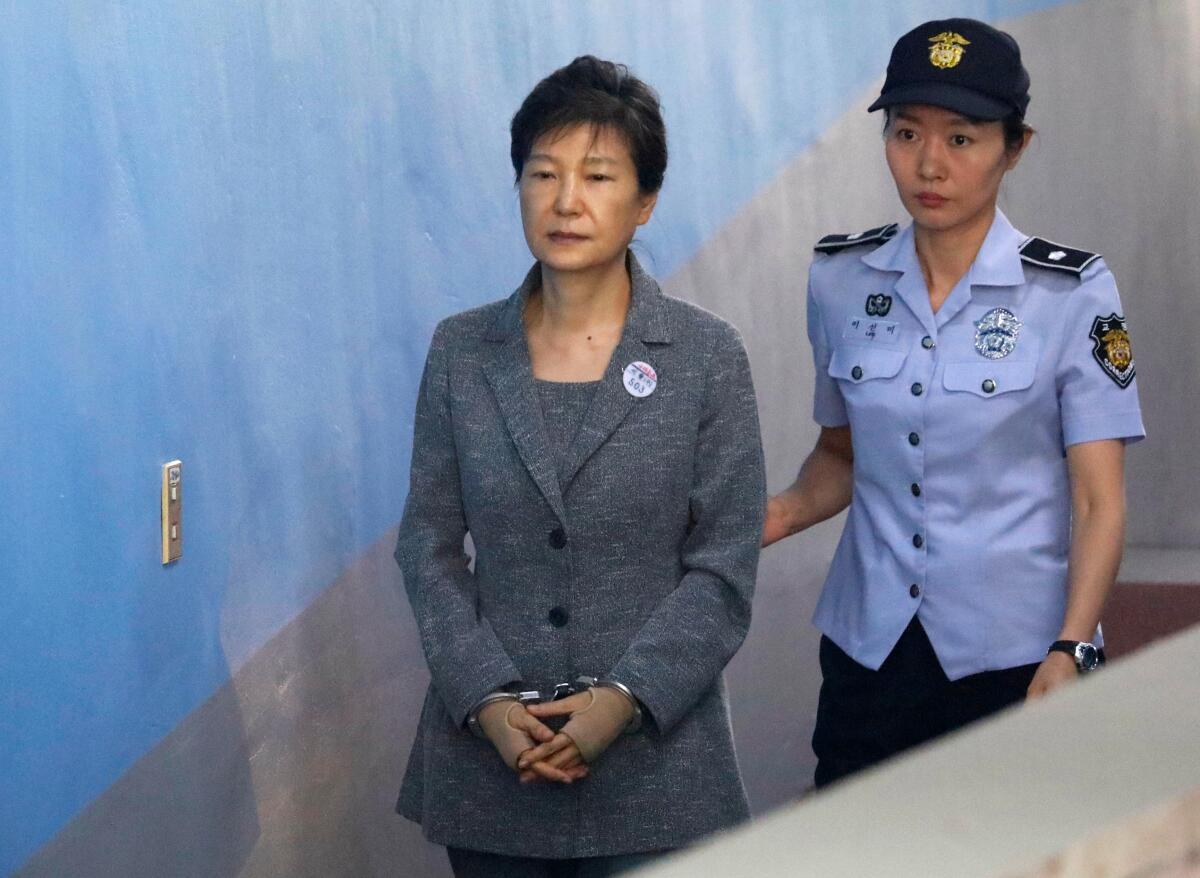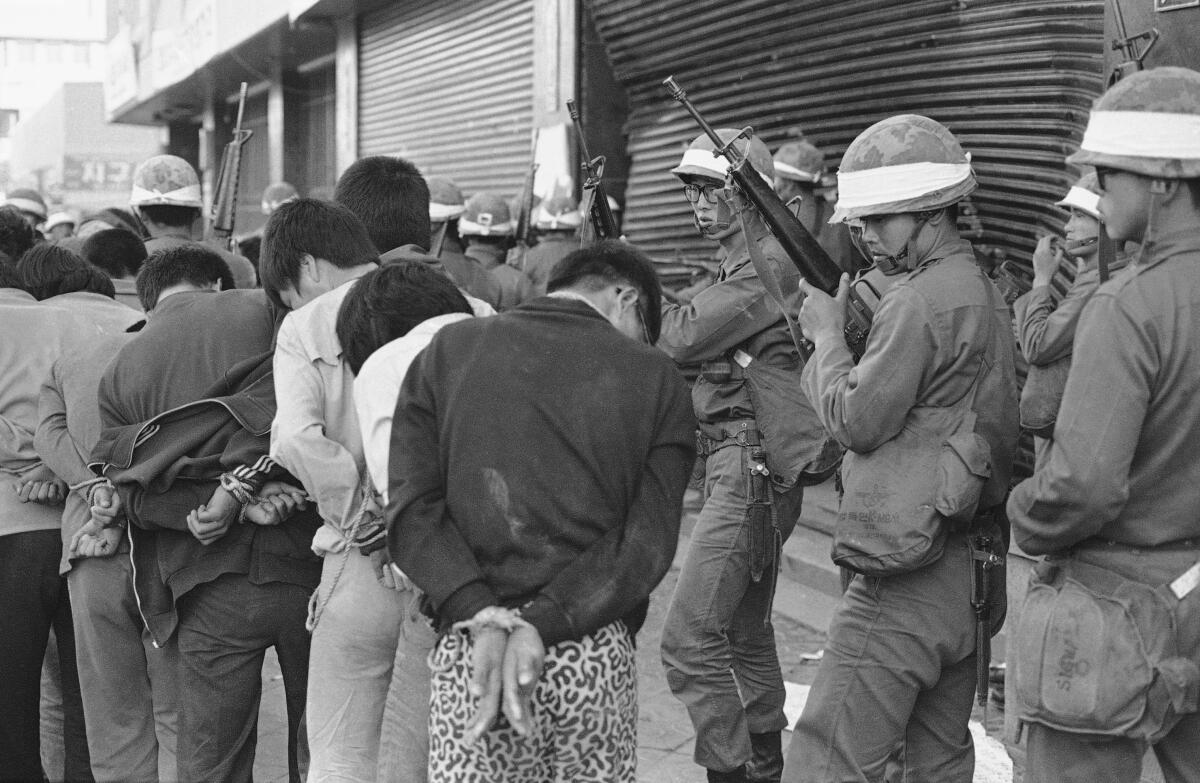SEOUL — It’s been a season of authorized woes for former South Korean President Yoon Suk Yeol.
His short-lived declaration of martial legislation on Dec. 3 first landed him in entrance of the Constitutional Courtroom — which eliminated him from workplace later that month — after which within the Seoul Central District Courtroom, the place he’s now being tried on expenses of riot.
There’s additionally the group of 105 irate residents suing Yoon for emotional damages associated to his energy seize, which despatched particular forces troopers to occupy the Nationwide Meeting and introduced the press briefly underneath navy management.
Members attend a rally to demand the impeachment of former South Korean President Yoon Suk Yeol.
(Ahn Younger-joon / Related Press)
Filed shortly after South Korean lawmakers voted to overrule Yoon’s martial legislation order final yr, the lawsuit is demanding compensation of 100,000 gained ($73) for every of its plaintiffs. The primary listening to is due later this month.
“The defendant’s declaration of emergency martial law and the actions that followed were unlawful, violating the plaintiffs’ basic rights as South Korean citizens such as the freedom to one’s life and body and the guarantee of human dignity, in addition to inflicting mental harm such as fear, anxiety, discomfort and shame,” the criticism mentioned.
Behind these phrases is Lee Gum-gyu, a 52-year-old legal professional who focuses on city improvement legislation, however has turn into nationally identified for dealing with down presidents of their impeachment trials.
The primary was conservative president Park Geun-hye, whom Lee, as a member of the legislature’s authorized crew, helped oust in 2016 following a significant graft scandal.
The second — and the one different South Korean chief to be faraway from workplace — was Yoon.
As a member of the Nationwide Meeting’s authorized crew within the Constitutional Courtroom trial that confirmed Yoon’s impeachment, Lee used his closing argument to talk of the concern he felt for his son, who was a conscript within the navy.
“The fact of emergency martial law itself filled me with fear, but the thought that my son might be deployed to enforce it was even more horrifying,” he mentioned.
The civil swimsuit, he says, is basically symbolic — one ultimate rebuke of Yoon. It’s why Lee gathered precisely 105 plaintiffs: the variety of pro-Yoon legislators who boycotted his impeachment.

Former South Korean President Park Geun-hye, left, arrives on the Seoul Central District Courtroom in 2017.
(Kim Hong-Ji / Related Press)
And the asking sum of 100,000 gained ($73) every?
“I thought about keeping it at 10,000 won ($7.30), but that seemed like too little. My pride wouldn’t let me,” Lee mentioned.
“Obviously there isn’t a formula for something like this, but 100,000 won just seemed more appropriate.”
The success price of emotional damages claims in opposition to former presidents isn’t excessive.
The closest instance is a collection of comparable fits filed by South Korean residents in opposition to Park in 2016. They sought 500,000 gained ($364) per plaintiff.
However the Supreme Courtroom dismissed these claims in 2020, saying that “even if there were South Korean citizens who felt emotions like anger due to the defendant’s actions, it cannot be said that this constituted a level of mental distress that necessitates compensation for every citizen.”
Nonetheless, Lee figures that his swimsuit in opposition to Yoon has a minimum of a slightly increased probability of success, given the far graver offense at hand.
“The case against Park was related to corruption — it wasn’t a case of the president unconstitutionally infringing on people’s basic rights,” he mentioned. “The martial law forces actually went to the National Assembly and pointed their rifles at legislators and their staff. I do think that people’s right to life was directly threatened.”
Some authorized specialists agree.
“I am also curious whether this will work or not,” mentioned a choose in Seoul who requested anonymity to touch upon an ongoing case. “Under current jurisprudence, I don’t think it’s entirely impossible.”
Given South Korea’s historical past with authoritarianism, Lee argues, the declare to emotional misery isn’t simply courtroom theater. South Koreans lived underneath a dictatorship as lately because the Eighties. Political repression and violence are nonetheless a part of the nation’s reminiscence.
The final declaration of martial legislation was made in Could 1980 by the Chun Doo-hwan navy junta, which despatched particular forces models to violently quash pro-democracy protests within the metropolis of Gwangju. Greater than 160 civilians have been killed, lots of them gunned down by troopers within the streets.

South Korean authorities troopers take prisoners to a set level within the riot-battered metropolis of Gwangju, South Korea, on Could 27, 1980. Korean Martial Legislation forces seized management of town in a predawn assault.
(Sadayuki Mikami / Related Press)
Lee, who’s from Gwangju, remembers watching a tank roll down the road behind his home as a baby.
“The national trauma from those events led to a real and deep fear in many South Koreans,” he mentioned.
Han Ki-chang, a actual property agent and one of many 105 plaintiffs, says that he suffered from “martial law insomnia.”
The time period entered the favored vernacular in the previous couple of months and has been coated by the nationwide media as an anecdotal phenomenon, with some older South Koreans saying it stirred panicked reminiscences of residing underneath authoritarian rule.
“It was real. I had trouble sleeping in January and February,” Han mentioned. “And I could tell I wasn’t the only one. Whenever I’d message people or post in a group chat in the middle of the night, a lot of people would respond, saying they needed to sleep but couldn’t.”
At the very least one different group is getting ready their very own emotional damages lawsuit in opposition to the previous president.
Lee, the legal professional, expects that there will probably be much more fits as a result of he has been sending out copies of his criticism to anybody who needs it. They’ll simply fill of their names and file their very own.
“If we win this case, that might make it possible for all 52 million South Korean citizens to claim damages,” he mentioned.
He shortly did the maths: at $7.30 per individual, a complete of $380 million.


